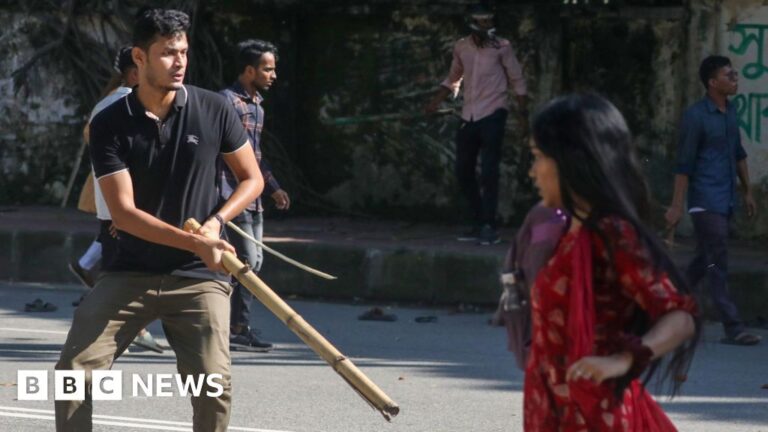Schools and universities in Bangladesh have been closed until further notice after six people were killed during protests against quotas in government jobs.
Students have been protesting for several days against the system of reserving jobs in the public sector for the children of war heroes who fought for the country’s independence from Pakistan in 1971.
Some jobs are also reserved for women, ethnic minorities and people with disabilities.
A third of the positions are reserved for the children of those considered war heroes. Students believe the system is discriminatory and want recruitment based on merit.
Several cities, including the capital Dhaka, have seen clashes this week between supporters of the anti-quota movement and those who oppose it, including the student wing of the ruling Awami League, known as the Bangladesh Chhatra League (BCL).
Groups of students attacked each other with bricks and sticks. Police fired tear gas and used rubber bullets to disperse the clashes. Student activists said hundreds of people were injured in the attacks.
“We blame the BCL members for the violence. They killed the protesters. The police did not intervene to save ordinary students,” Abdullah Salehin Ayoun, one of the coordinators of the anti-quota movement, told the BBC.
Government jobs are highly sought after in Bangladesh because they are well paid. In total, more than half of the positions, or hundreds of thousands, are reserved for certain groups.
Critics say the system unfairly advantages children of pro-government groups that support Prime Minister Sheikh Hasina, who won her fourth consecutive election in January.
Ms Hasina’s government abolished the reserve in 2018 following protests.
But a court ordered authorities to reinstate the quotas in early June, sparking a new wave of protests.
Authorities said three people were killed in the southern port city of Chittagong and two in Dhaka, while a student was killed in the northern city of Rangpur by a stray bullet.
According to media reports, at least three of those killed were students, although there is no official confirmation yet.
The government blames opposition groups for the violence.
“The student fronts of the opposition Jamaat-e-Islami and the Bangladesh Nationalist Party (BNP) have infiltrated this anti-quota movement. They are the ones who initiated the violence,” Law Minister Anisul Huq told the BBC.
Bangladesh’s Supreme Court suspended the current system last week, but protests are expected to continue until it is permanently scrapped.
“The case has been listed for hearing on August 7. The students have been given an opportunity to present their arguments before the court,” Mr Huq said.
In a late night raid on Tuesday, police raided the headquarters of the main opposition BNP in Dhaka following violent clashes.
Senior BNP leader Ruhul Kabir Rizvi said the raid was nothing but a tragedy and was a message for students to return home.
The protests have been going on for days, with students blocking roads and highways in Dhaka and other major cities, paralysing traffic.
Student leaders said they were angry at recent comments by Ms Hasina which they said described those opposing job quotas as razakar – term used to refer to those who allegedly collaborated with the Pakistani army during the 1971 war.
Several student leaders said Ms Hasina had insulted them by comparing them to razakar. This comparison, they said, also encouraged BCL members to attack them.
“They want to suffocate us by establishing a reign of terror in the country. If I don’t protest today, they will beat me another day. That’s why I am on the streets protesting,” Rupaiya Sherstha, a student at Dhaka University, told the BBC.
But government ministers say Ms Hasina’s comments were misinterpreted and that she did not call the students. razakar.
Mohammad Ali Arafat, Minister of State for Information and Broadcasting, denied allegations that the Awami League’s student wing had started the violence.
He said the unrest started after anti-quota students intimidated residents of a hostel in Dhaka.
“If there is chaos on university campuses, the government will have no interest in it. We want peace to be maintained,” Mr Arafat told the BBC.
UN Secretary-General António Guterres called on the government to “protect protesters from any form of threat or violence,” according to his spokesman Stéphane Dujarric.
The students vowed to continue their protests until their demands are met.
The government has stepped up security by deploying paramilitary forces, the Border Guards Bangladesh, in five major cities, including Dhaka and Chittagong.


